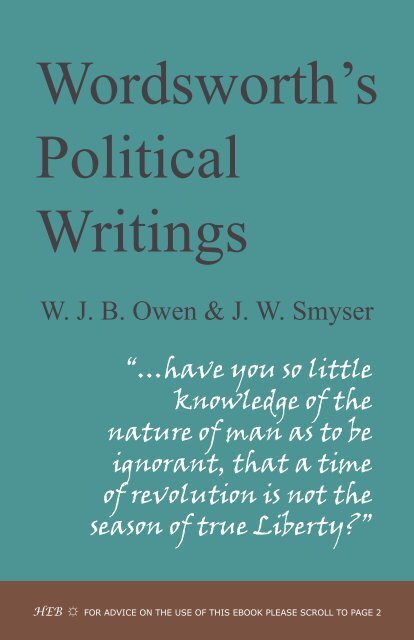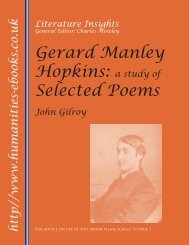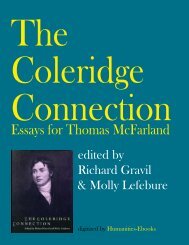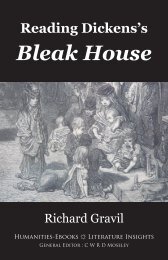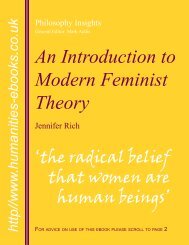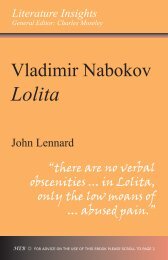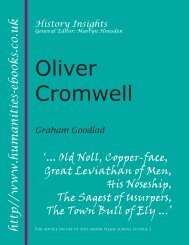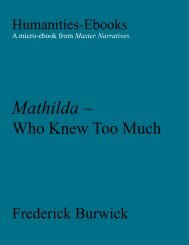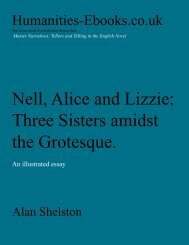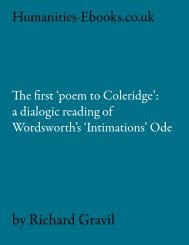Wordsworth's Political Writings - Humanities-Ebooks
Wordsworth's Political Writings - Humanities-Ebooks
Wordsworth's Political Writings - Humanities-Ebooks
Create successful ePaper yourself
Turn your PDF publications into a flip-book with our unique Google optimized e-Paper software.
Wordsworth’s<br />
<strong>Political</strong><br />
<strong>Writings</strong><br />
W. J. B. Owen & J. W. Smyser<br />
“…have you so little<br />
knowledge of the<br />
nature of man as to be<br />
ignorant, that a time<br />
of revolution is not the<br />
season of true Liberty?”<br />
HEB ☼ FOR ADVICE ON THE USE OF THIS EBOOK PLEASE SCROLL TO PAGE 2
To Buy This Book<br />
If this is what you are looking for please<br />
Buy this Book<br />
or<br />
Browse our lists<br />
Pdf Ebook Features:<br />
elegantly formatted<br />
fixed page formats are easily cited<br />
high quality graphics<br />
internal and external hyperlinks<br />
easy navigation by bookmarks<br />
ideal for laptops, desktops and tablets<br />
The book is yours to keep - and a copy is stored on<br />
your bookshelf in case you lose it.<br />
We also sell:<br />
Kindle editions from Amazon.com and Amazon.co.uk<br />
Paperbacks from Lulu.com and Troubador.co.uk<br />
Library Editions from MyiLibrary and EBSCO
Wordsworth’s <strong>Political</strong> <strong>Writings</strong><br />
edited by W. J. B. Owen and Jane Worthington Smyser<br />
HEB ☼ <strong>Humanities</strong>-<strong>Ebooks</strong>, LLP
© The Estate of W. J. B. Owen, 2009<br />
The Estate has asserted W. J. B. Owen’s right to be identified as the author of<br />
this Work in accordance with the Copyright, Designs and Patents Act 1988.<br />
First published by <strong>Humanities</strong>-<strong>Ebooks</strong>, LLP<br />
Tirril Hall, Tirril, Penrith CA10 2JE<br />
The Ebook (with the facility of word and phrase search) is available exclusively<br />
from http://www.humanities-ebooks.co.uk or MyiLibrary.com.<br />
The Paperback is available exclusively from http://www.troubador.co.uk<br />
ISBN 978-1-84760-064-6 Ebook<br />
ISBN 978-1-84760-076-9 Paperback
Contents<br />
Publisher’s Preface 7<br />
Abbreviations 9<br />
A Letter to the Bishop of Llandaff 13<br />
Introduction 14<br />
A Letter to the Bishop of Llandaff 23<br />
Excursus Notes to the Letter 57<br />
The Convention of Cintra 59<br />
Introduction 60<br />
Advertisement 69<br />
Concerning the Convention of Cintra 71<br />
[Wordsworth’s] Appendices 236<br />
The Armistice 247<br />
The Convention 249<br />
[De Quincey’s] Postscript on Sir John Moore’s Letters 256<br />
Excursus Notes to the Cintra 273<br />
Two Addresses to the Freeholders of Westmorland 279<br />
Introduction 280<br />
Advertisement 291<br />
[Wordsworth’s] Note 349<br />
[Wordsworth’s]Appendix 353<br />
Excursus Notes to the Addresses 370<br />
Postscript, 1835 375<br />
Introduction 376<br />
Postscript, 1835 385<br />
Appendix to the Postscript 413<br />
Excursus Notes to the Postscript 424
Publisher’s Preface<br />
There has never, to my knowledge, been an edition of Wordsworth’s<br />
<strong>Political</strong> <strong>Writings</strong>, to stand beside the eminently useful collection of<br />
Shelley’s, or Coleridge’s, or indeed W. J. B. Owen’s collection of<br />
Wordsworth’s Literary Criticism. This edition is an attempt to fill that<br />
gap with an affordable, convenient and (in the case of the ebook)<br />
searchable text of A Letter to the Bishop of Llandaff; Concerning<br />
the Convention of Cintra, the Two Addresses to the Freeholders of<br />
Westmorland, and the 1835 Postscript. Arguably, perhaps, The Guide<br />
to the Lakes, as a work entailing both environmental consciousness<br />
and human geography, should also be included, but it is more easily<br />
available in recent editions.<br />
The texts, introductions and notes in this collection, are taken<br />
from The Prose Works of William Wordsworth, as edited by W. J.<br />
B. Owen and Jane Worthington Smyser and published by Clarendon<br />
Press in 1974. Readers needing the detailed textual notes and textual<br />
introductions in the Owen & Smyser Prose Works are referred to the<br />
3-volume Clarendon edition or, in the case of the first two texts, to<br />
the <strong>Humanities</strong>-<strong>Ebooks</strong> edition of Volume 1 (2008). Almost all of<br />
their meticulous and still invaluable commentary has been retained<br />
for this edition but for convenience most of the commentary has<br />
been converted into page by page footnotes, where its value may<br />
be more easily recognized. Some cross-referencing by line numbers<br />
in the Clarendon edition has been omitted, though some remains<br />
(the presence of a line number indicates a cross-reference to the<br />
Clarendon text or commentary). Some longer notes, which would<br />
break up the page excessively, appear as hyperlinked ‘excursus notes’<br />
after the text in question. One or two footnotes have been added, but<br />
the edition is essentially theirs, or more exactly, Professor Owen’s in<br />
the case of the first three works, and Professor Smyser’s in the case<br />
of the Postscript.
Wordsworth’s <strong>Political</strong> <strong>Writings</strong><br />
The purpose of the present volume is simple: it is to allow students<br />
of Wordsworth to follow, in a single volume, the struggle between<br />
Jacobinism, republicanism, nationalism, liberalism, conservatism<br />
and social democracy in Wordsworth’s thought.<br />
For a book containing just four works, by a single hand, the range<br />
is remarkable. In the first text, of 1793, Wordsworth is an unashamed<br />
apologist for terror, a regicide, whose thinking appears ‘to the last<br />
degree’ Paineite and French (I allude, of course to Lord Macaulay’s<br />
astonished comment, on reviewing the 1850 Prelude, that its author<br />
had been, in his youth, ‘to the last degree Jacobinical, indeed socialist’).<br />
In 1808, while scornful of the ‘paradoxical reveries’ of Enlightenment<br />
argument, Wordsworth remains an impassioned advocate of people’s<br />
power and (inter-)national renewal, yet his passionate conviction that<br />
Napoleon is distinguished primarily for liberticide and immoralism,<br />
makes him see his own country increasingly as the natural home<br />
of ‘true liberty’. By 1818, impelled towards Toryism by the<br />
vacillation of the Whigs in the later stages of his country’s struggle<br />
with ‘the intoxicated setter-up of Kings’, as he called Napoleon, he<br />
advocates what true Whigs called ‘old corruption’ as a necessary<br />
constitutional lubricant, or at least as preferable to the shedding of<br />
blood. Yet in the independently minded and broadly liberal 1835<br />
Postscript, he combines some very Coleridgean arguments for a<br />
responsible (Anglican) clerisy, with an advocacy of social welfare,<br />
and a vigorous assault on the Poor Law Amendment Act and other<br />
aspects of industrial capitalism. His strategy in this work is peculiarly<br />
illustrative of the difficulty one has in assessing his later political<br />
stance. He concludes it by citing, in an overtly anti-Chartist frame<br />
of mind, a passage reflecting on the kind of poetry much admired by<br />
the Chartists—poetry celebrating the dignity of the common man.<br />
To a poet who prided himself on consistency, the (overtly) Jacobin<br />
quotation on the cover of this book may well have appeared quite as<br />
apt to the last of these political texts, as to the first.<br />
The Publisher and the Estate are grateful to The Wordsworth Trust<br />
for permission to reissue these invaluable texts in electronic and<br />
paperback formats.<br />
Richard Gravil, Tirril, 2009
A Letter to the Bishop of Llandaff
Introduction<br />
DURING his second stay in Paris, in the late autumn and early<br />
winter of 1792, Wordsworth sometimes imagined himself taking an<br />
active, even a dramatic, role in the Revolution. Although conscious<br />
of being ‘An insignificant Stranger … and little graced with power<br />
/ Of eloquence even in my native speech’ (Prel. X. 131–3), he was<br />
eager to do whatever an obscure young Englishman could do who<br />
was ‘enflam’d with hope’ (Prel. X. 38) for the new French Republic.<br />
In The Prelude, as he describes his frame of mind during those final<br />
weeks in Paris, one senses genuine regret that his voice, speaking for<br />
the Revolution, should go unheard.<br />
In January 1793 Richard Watson, Bishop of Llandaff, unknowingly<br />
furnished Wordsworth, who was now living in London, with an occasion<br />
for speaking out in defence of republicanism. Announcements of the<br />
execution of Louis had appeared in the London papers on 24 January<br />
1793; fuller news of the execution began appearing in the papers the<br />
following day. Thoroughly shocked at the course of events in France,<br />
Watson hurriedly composed an indignant protest, larded with fervent<br />
praise of the British Constitution. Dating his composition 25 January,<br />
Watson attached it as an Appendix to a Sermon he had preached<br />
some years before; on 30 January the Sermon with its Appendix was<br />
advertised in The Morning Herald as ‘This day … published’; it was<br />
similarly advertised in The Times a week later (7 February).<br />
Although Watson’s Appendix does not strike a modern reader<br />
as especially challenging, it is understandable why to Wordsworth<br />
Watson would have appeared a formidable and worthy opponent. For<br />
For bibliography of the sermon see Excursus Note, page 57 below.<br />
For some years Watson’s reputation would have been well known to Wordsworth.<br />
A native of Heversham, Westmorland, and a fellow of Trinity College, Cambridge,<br />
Watson had been Regius Professor of Divinity at Cambridge until 1787. He then<br />
retired to Calgarth Park, his estate on Windermere (Anecdotes of the Life of<br />
Richard Watson, Bishop of Landaff; Written by Himself (London, 1817), pp.
Letter to the Bishop of Llandaff 15<br />
many years Watson had spoken for liberal causes: besides numerous<br />
publications on Church questions, all in a liberal vein, he had also<br />
written in favour of the American Revolution, and even in favour<br />
of the French Revolution. Though he had, in his political sermons,<br />
deplored all forms of ‘Republican Tyranny’, his reputation for liberalism<br />
was a wide one, and others besides Wordsworth were surprised by<br />
what they found in the Appendix. The Critical Review (vii [February<br />
1793], 212–15), with its Tory bias, understandably made much of the<br />
fact that Watson had come at last to recognize the excellence of the<br />
British Constitution. Later that year the reviewer in The Gentleman’s<br />
Magazine (lxiii [July 1793], 633–6) was so impressed with Watson’s<br />
new arguments that he felt it his ‘duty’ to give the Appendix ‘in its<br />
fullest extent’—a duty which he fulfilled by quoting all but the introductory<br />
paragraph. But it is a measure of the fearfulness and general<br />
anti-Jacobinism of the day that the liberal reviews also found much to<br />
praise in the Appendix and voiced only the mildest of reservations. <br />
Like Wordsworth (Llandaff, 42–8), the reviewer in The European<br />
Magazine recognized the Watson’s arguments would ‘probably have<br />
more weight with a certain class of men, than if they had come from<br />
a more avowed friend of the present Governing Powers’, but, unlike<br />
Wordsworth, this reviewer went on to praise Watson’s ‘moderate’<br />
sentiments. If the reviews we have cited are typical of the general<br />
3 and 183–7). Here his extensive tree planting attracted the attention of the<br />
young Christopher Wordsworth (The Early Wordsworthian Milieu, ed. Zera Fink<br />
(Oxford, 1958), pp.11–12, 78, 123–4). For Wordsworth’s later acquaintance with<br />
Watson see M.Y. i. 206, 229; ii. 172, 208, 330; and Moorman ii. 231.<br />
e.g. A Sermon Preached before the University of Cambridge, on October 25,<br />
1776 (Cambridge, 1776), pp. 12–13; A Letter to His Grace the Archbishop of<br />
Canterbury, 2nd edn. (London, 1783); A Charge Delivered to the Clergy of the<br />
Archdeaconry of Ely on Thursday, June 12, 1788 (Cambridge, 1788).<br />
The Principles of the Revolution vindicated in a Sermon preached before the<br />
University of Cambridge, on Wednesday, May 29, 1776 (Cambridge, 1776); A<br />
Sermon Preached before the Lords Spiritual and Temporal in the Abbey-Church,<br />
Westminster (London, 1784). In his autobiography (Anecdotes, p. 59), Watson<br />
says that for the former sermon he was ‘much abused by ministerial writers, as<br />
a man of republican principles’.<br />
A Charge Delivered to the Clergy of the Diocese of Landaff, June, 1791 (London,<br />
1792).<br />
e.g. European Magazine and London Review, xxiii (Feb. 1793), 111–13; Analytical<br />
Review, xv (Mar. 1793), 310–12; Monthly Review, x (Apr. 1793), 476–8.
16 Wordsworth’s <strong>Political</strong> <strong>Writings</strong><br />
response to the Appendix, Wordsworth must have felt quite alone as<br />
he set out to refute the redoubtable Bishop of Llandaff.<br />
Precisely when the ‘Letter’ was written is not known. There is no<br />
authoritative date on the single surviving manuscript, nor have we<br />
found any contemporary reference to the date of composition. But,<br />
after a careful study of the topical allusions in the ‘Letter’ itself, we<br />
believe that it was most probably composed in February or March,<br />
for all the allusions are to events antecedent to the execution of<br />
Louis, or the to the ‘present convulsions’ (54) immediately attendant<br />
upon that event. The ‘modish lamentation’ (49–50) which Watson is<br />
rebuked for having joined can hardly have lasted much beyond the<br />
formal mourning of the Court, 27 January till 7 February. And had the<br />
‘Letter’ been written much later than the middle of March, one would<br />
expect it to reflect the rapidly changing situation in France. For example,<br />
The Morning Herald, of 23 March, in reporting the crucial defection<br />
of Dumouriez, observed that he had ‘now committed exactly the<br />
same offence against the French Convention as La Fayette offered<br />
to the last National Assembly’; as the details of Dumouriez’s treason<br />
figured more and more prominently in the London papers, any reference<br />
to Lafayette’s desertion in August 1792—such as the one in<br />
Wordsworth’s final paragraph—would become wholly outmoded.<br />
Cf. also Llandaff, 654, where Watson, whose Appendix is dated 25 Jan., is said<br />
to be giving his ‘opinions upon the present turbulent crisis’. Charles W. Roberts,<br />
who sees a Godwinian influence on Wordsworth’s ‘Letter’, was the first to<br />
argue that Llandaff ‘could not have been written before the June of 1793’ (‘The<br />
Influence of Godwin on Wordsworth’s “Letter to the Bishop of Llandaff”, Studies<br />
in Philology, xxix (1932), 591). Pointing to Wordsworth’s having referred to the<br />
attack on Priestley’s house in 1791 as though it were a recent event, Roberts<br />
endeavours to persuade us that Wordsworth is inaccurate in his use of such<br />
terms as present crisis, lately, at the moment, etc.; but as our note to 234–7 indicates,<br />
references to the attack on Priestley were entirely topical during the winter<br />
of 1792–3. Roberts’s later dating depends chiefly, however, on Wordsworth’s<br />
reference to parliamentary reform (Llandaff, 587–8). According to Roberts, this<br />
reference could not have been made until after Grey’s motion for reform on 6<br />
May 1793. Again, our note to 587–8 shows that this argument is by no means<br />
valid. Unfortunately, Roberts’s dating of Llandaff has been accepted implicitly<br />
by F. M. Todd, Politics and the Poet (London, 1957), pp. 58–62, and explicitly<br />
by Mark L. Reed, Wordsworth: the Chronology of the Early Years (Cambridge,<br />
Mass., 1967), p. 142. Mary Moorman (i. 255) and G. W. Meyer (Wordsworth’s<br />
Formative Years [Ann Arbor, 1943], pp. 95, 117) think that the ‘spring’ of 1793 is<br />
the probable date, but neither argues the matter.
Letter to the Bishop of Llandaff 17<br />
Effectively to counteract Watson’s pamphlet, and the favourable<br />
reception given it in at least two February journals, Wordsworth<br />
needed to be prompt. His own outward circumstances would have<br />
permitted him to go to work at once. Descriptive Sketches had been<br />
published on 29 January; he was unoccupied and in touch with his<br />
publisher Joseph Johnson, at whose shop he met other young radicals<br />
who would presumably have encouraged a rebuttal of Watson; <br />
living at Staple Inn with his brother Richard, he had access to all<br />
the London newspapers and journals. But if outward circumstances<br />
were favourable to work, the inner turmoil was not. To appreciate the<br />
passionate sincerity of Wordsworth’s ‘Letter to Llandaff’, one should<br />
read it in conjunction with Book X of The Prelude. There brilliantly<br />
described is Wordsworth’s state of mind following the outbreak of<br />
war between England and France. The war had torn ‘By violence at<br />
one decisive rent / From the best Youth in England, their dear pride, /<br />
Their joy, in England’ (X. 277–9).<br />
I felt<br />
The ravage of this most unnatural strife<br />
In my own heart; there lay it like a weight<br />
At enmity with all the tenderest springs<br />
Of all my enjoyments. I, who with the breeze<br />
Had play’d, a green leaf on the blessed tree<br />
Of my beloved country; nor had wish’d<br />
For happier fortune than to wither there,<br />
Now from my pleasant station was cut off,<br />
And toss’d about in whirlwinds. (X. 250–9)<br />
Such a mood might nourish passionate bursts of oratory, but it<br />
So announced that day in The Morning Herald. Cf. Mark L. Reed, op. cit., p.<br />
140.<br />
Moorman, i. 218–19; Herschel Baker, William Hazlitt (Cambridge, Mass., 1962),<br />
pp. 56–7; Andrew Gilchrist, The Life of William Blake, ed. W. G. Robertson (New<br />
York, 1906), pp. 93–7.<br />
For Wordsworth’s residence at Staple Inn see Moorman i. 211, and Chester<br />
L. Shaver, Review of English Studies, N.S. xii (1961), 55–7. If the ‘Letter’ was,<br />
as we think, composed at Staple Inn, then Richard was perhaps remembering<br />
it when in May 1794 he wrote to William, urging him to ‘be cautious in writing<br />
or expressing your political opinions. By the suspension of the Habeas Corpus<br />
Acts the Ministers have great powers’ (E.Y. 121).
18 Wordsworth’s <strong>Political</strong> <strong>Writings</strong><br />
would seem ill-suited to sustained reasoning and historical analysis,<br />
especially in a writer uncertain of his powers in prose. And yet,<br />
unfinished and occasionally imperfect as the ‘Letter’ is, Wordsworth’s<br />
arguments are marshalled into an exposition that is both cogent and<br />
powerful.<br />
Some of the sources upon which Wordsworth drew in composing<br />
his ‘Letter’ are indicated in the ‘Commentary’, but perhaps the<br />
most important are not there cited. Basic to the ‘Letter’ are his own<br />
experiences in France, not only in 1791–2, but also in the summer of<br />
1790—the sights he saw, the conversations he had, the speeches he<br />
heard, the newspapers he read. In Paris he attended both the National<br />
Assembly (having been ‘introduced’ by a member (E.Y., p. 71))<br />
and the Jacobin Club (Prel. IX. 46–9); eagerly he read ‘the master<br />
Pamphlets of the day (Prel. IX. 96), and daily he felt the ‘shocks’<br />
of public news (Prel. IX. 177–82). Carra and Gorsas are the only<br />
journalists whom he mentions by name in The Prelude (IX. 178),<br />
but there were many others he might have mentioned as familiarly.<br />
The National Assembly regularly ordered speeches and reports to be<br />
printed and circulated through the Departments, and individual deputies<br />
were constantly printing their own political views. Of the hundreds<br />
of ephemeral writings which he must have seen we can recover<br />
very few; in annotating the historical allusions we have, however,<br />
been mindful of the dates of his residence in France. Hence, as far<br />
as possible, French sources have been used for the historical events<br />
of December 1791 to December 1792, and English sources for those<br />
thereafter.<br />
Among the established political writers known to Wordsworth,<br />
Rousseau and Paine appear to have exerted the strongest influence<br />
upon the ‘Letter to Llandaff’. Because the verbal parallels between<br />
their writings and Wordsworth’s are significantly numerous and often<br />
very close, these two writers are frequently referred to in our notes.<br />
But in every case an indebtedness is not necessarily implied: the<br />
See E.Y., p. 127 (June 1794): ‘I have not been much used to composition of any<br />
kind particularly in prose, my style therefore may frequently want fluency and<br />
sometimes perhaps perspicuity but these defects will gradually wear off.<br />
For Paine’s influence, see E. N. Hooker, ‘Wordsworth’s “Letter to the Bishop of<br />
Llandaff”’, Studies in Philology, xxviii (1931), 522–31.
Letter to the Bishop of Llandaff 19<br />
teachings of Paine and Rousseau were ‘in the air’, and statements<br />
of theirs were parroted by hundred of lesser writers and orators, in<br />
England as well as France.<br />
Two other possible influences upon Wordsworth’s ‘Letter’ are<br />
omitted from our notes. There was in revolutionary France a new and<br />
lively interest in English political writers of the seventeenth century;<br />
Zera Fink has argued that Wordsworth shared this interest, and that<br />
his ‘Letter’ reflects political theory derived from Milton, Harrington<br />
and Algernon Sydney. Because the similarities which Fink points to<br />
are similarities of broad theoretical concept rather than of particular<br />
phrasing, we have had to omit from our notes references to all but one<br />
of these parallels. A second possible influence, omitted from our notes<br />
for a different reason, is Godwin’s <strong>Political</strong> Justice. The argument<br />
for Godwin’s influence has been most strongly urged by Charles W.<br />
Roberts, and his argument has been recently repeated by F. M. Todd. <br />
Apart from the fact that <strong>Political</strong> Justice was not published until after<br />
the middle of February 1793, and that Wordsworth would, therefore,<br />
have had difficulty in mastering its arguments in time for a reply to<br />
Watson’s Appendix, there are other reasons which lead us to believe<br />
that Godwin exerted no influence upon Wordsworth’s ‘Letter’. Some<br />
of Godwin’s most important tenets are in direct contradiction to the<br />
‘Wordsworth and the English Republican Tradition’, J.E.G.P. xlvii (1948),<br />
107–8.<br />
Roberts, op. cit.; Todd, op. cit., pp. 60–2. Arthur Beatty (William Wordsworth, his<br />
Doctrine and Art in their Historical Relations, 2nd edn.(Madison, 1927), p. 31–2)<br />
and G. M. Harper (William Wordsworth, 3rd edn. (London, 1929), pp. 185–6)<br />
also saw a strong influence from Godwin in the Letter.<br />
Mark L. Reed (op. cit., p. 141), referring to The London Chronicle, gives 16<br />
February as the date of publication. On 16 February The Morning Herald<br />
repeated an advertisement of <strong>Political</strong> Justice identical with one made on 8<br />
February: ‘Next week will be published’. On 21 and 25 February it again carried<br />
identical advertisements of <strong>Political</strong> Justice: ‘This day is published’. The first<br />
advertisement in The Times that <strong>Political</strong> Justice was now published appeared<br />
on 22 February.<br />
Cf. for views similar to ours, R. D. Havens, The Mind of a Poet (Baltimore, Md.,<br />
1941), 543; F. E. L. Priestley (ed.), Enquiry Concerning <strong>Political</strong> Justice (Toronto,<br />
1946), iii. 102–3; Zera Fink, J.E.G.P. xlvii (1948), n. 33, p. 111: Herschel Baker,<br />
op. cit., 68–9; Moorman, i. 255 (‘whereas the Letter to the Bishop of Llandaff<br />
shows no trace of Godwin’s doctrines, the letter to Matthews of June 1794 certainly<br />
does’).
20 Wordsworth’s <strong>Political</strong> <strong>Writings</strong><br />
very heart of Wordsworth’s ‘Letter’: for example, Godwin repudiates<br />
entirely the doctrine of social contract (‘it is impossible for<br />
any government to derive its authority from an original contract’);<br />
he condemns all talk of the ‘Rights of Man’; he disavows revolution<br />
by violence and all recourse to force; he attacks national assemblies,<br />
contemptuously calling decision by vote ‘that intolerable insult<br />
upon all reason and justice’. Wherever similarities occur between<br />
Wordsworth’s ‘Letter’ and Godwin’s <strong>Political</strong> Justice, it is possible<br />
to find a common source, usually Paine.<br />
There remains one other problem connected with Wordsworth’s<br />
‘Letter’: why was it not published in 1793? Two answers may be<br />
suggested. First, although it could have preserved him from the censure<br />
of conservative elders within the family, anonymous authorship<br />
would not have precluded government inquiry. A Proclamation<br />
against seditious writing was made in May 1792, and in December<br />
Thomas Paine, although by this time in Paris and a member of the<br />
National Convention, was found guilty of sedition for having written<br />
The Rights of Man, Part Second. Any misgivings inspired in<br />
Wordsworth by this condemnation, or by similar actions taken against<br />
other writers, may have been seconded by Joseph Johnson. Although<br />
he was the publisher of Priestley, Horne Tooke, Godwin, and other<br />
radicals, Johnson was not wholly lacking in caution: he had printed<br />
The Rights of Man, Part First, but ‘became frightened after a few<br />
copies were out … and the work was transferred to J. S. Jordan’. As<br />
Wordsworth’s publisher, he may have advised against publication. A<br />
second possible answer is that events in France may have checked<br />
Wordsworth. If we are correct in assigning February or March as<br />
the date of composition, the news of the widespread insurrections<br />
in France and of the civil war begun by the Vendean armies—both<br />
rumoured in late March and fully reported in the London papers of<br />
early April—would have sadly undercut Wordsworth’s contention that<br />
the revolution expressed the unanimous wish of twenty–five million<br />
An Enquiry Concerning <strong>Political</strong> Justice (London, 1793), i. 149, 109–19, 202–3;<br />
ii. 571.<br />
Phillip Anthony Brown, The French Revolution in English History (London,<br />
1918), pp. 84–7.<br />
M. D. Conway (ed.), The <strong>Writings</strong> of Thomas Paine (New York, 1906), ii. 260.
A Letter to the Bishop of Llandaff<br />
My Lord,<br />
Reputation may not improperly be termed the moral life of man.<br />
Alluding to our natural existence, Addison, in a sublime allegory well<br />
known to your Lordship, has represented us as crossing an immense<br />
bridge, from whose surface from a variety of causes we disappear<br />
one after another, and are seen no more. Every one, who enters upon<br />
public life, has such a bridge to pass, some slip through at the very<br />
commencement of their career from thoughtlessness, others pursue<br />
their course a little longer till, misled by the phantoms of avarice<br />
and ambition, they fall victims to their delusion. Your Lordship was<br />
either seen, or supposed to be seen, continuing your way for a long<br />
time, unseduced and undismayed; but those, who now look for you,<br />
will look in vain, and it is feared you have at last fallen, through one<br />
of the numerous trap–doors, into the tide of contempt to be swept<br />
down to the ocean of oblivion. <br />
It is not my intention to be illiberal; these latter expressions have<br />
been forced from me by indignation. Your Lordship has given a proof<br />
‘The first Vision of Mizrah’ (The Spectator, ed. D. F. Bond (Oxford, 1965), No.<br />
159, ii. 121–6). At Cambridge Wordsworth had ‘translated the Vision of Mizra,<br />
and two or three other papers of the Spectator, into Italian’ (Autobiog. 106–7).<br />
Cf. also Miscellaneous Sonnets, VIII (P.W. iii. 5).<br />
Addison’s allegory continues to supply the metaphorical figures: ‘As I looked<br />
more attentively, I saw several of the Passengers dropping thro’ the Bridge,<br />
into the great Tide that flowed underneath it; and upon further Examination,<br />
perceived there were innumerable Trap-doors that lay concealed in the Bridge,<br />
which the Passengers no sooner trod upon, but they fell through them into the<br />
Tide and immediately disappeared’ (The Spectator, ii. 123). The ‘tide of contempt’<br />
and ‘the ocean of oblivion’ are Wordsworth’s own terms; Addison had<br />
identified the water as ‘Part of the great Tide of Eternity’, or ‘that Portion of<br />
Eternity which is called Time’.
24 Wordsworth’s <strong>Political</strong> <strong>Writings</strong><br />
that even religious controversy may be conducted without asperity; <br />
I hope I shall profit by your example. At the same time with a spirit<br />
which you may not approve, for it is a republican spirit, I shall not<br />
preclude myself from any truths, however severe, which I may think<br />
beneficial to the cause which I have undertaken to defend. You will<br />
not then be surprized when I inform you that it is only the name of<br />
its author which has induced me to notice an Appendix to a sermon,<br />
which you have lately given to the world, with a hope that it may<br />
have some effect in calming a perturbation which you say has been<br />
excited in the minds of the lower orders of the community. While,<br />
with a servility which has prejudiced many people against religion<br />
itself, the ministers of the church of England have appeared as writers<br />
upon public measures only to be the advocates of slavery civil<br />
and religious, your Lordship stood almost alone as the defender of<br />
truth and political charity. The names of levelling prelate, bishop of<br />
the dissenters, which were intended as a dishonour to your char-<br />
Before 1793 Watson’s most notable religious controversy was one with Edward<br />
Gibbon. Attempting to refute Gibbon’s fifteenth chapter, Watson published An<br />
Apology for Christianity, in a Series of Letters, Addressed to Edward Gibbon<br />
(Cambridge, 1776). This volume went through many editions; in A Vindication<br />
of Some Passages in the Fifteenth and Sixteenth Chapters of the History of the<br />
Decline and Fall of the Roman Empire (London, 1779) Gibbon praised the ‘liberal<br />
and philosophic cast’ of Watson’s thought and the ‘politeness and moderation’<br />
of his expression (p. 93).<br />
Appendix, p. [17]: ‘If it [the Sermon] shall have any effect in calming the perturbation<br />
which has been lately excited, and which still subsists in the minds of the<br />
lower classes of the community, I shall not be ashamed of having given to the<br />
world a composition in every other light uninteresting.’ This sentence is from the<br />
opening paragraph of the Appendix, the one paragraph not quoted in the review<br />
of Watson in The Gentleman’s Magazine, lxiii (July 1793), 633.<br />
Evidence supporting this charge may be found in W. T. Laprade, England and<br />
the French Revolution (Baltimore, Md., 1909), pp. 70–1 and 84. For reviews and<br />
summaries of typical sermons see, for example, Gentleman’s Magazine, lxiii<br />
(Feb. 1793), 155–7; ibid. lxiii (Mar. 1793), 249; European Magazine, xxiii (Feb.<br />
1783), 129 and 136.<br />
Cf. Parliamentary Proceedings of 9 May 1792, reported in The Gentleman’s<br />
Magazine, lxii (Nov. 1792), 1014: ‘The Right Reverend Prelate … being perhaps<br />
what his brother of Landaff is, a Dissenting Bishop’; Analytical Review, xv (Mar.<br />
1793), 311: ‘The bishop of Landaff has long been misrepresented as a dissenter<br />
and a republican.’ Watson had urged toleration towards Dissenters in A Sermon<br />
Preached before the University of Cambridge (Cambridge, 1776), pp. 12–13,<br />
and in A Charge Delivered to the Clergy of the Diocese of Landaff (London,
To Buy This Book<br />
If this is what you are looking for please<br />
Buy this Book<br />
or<br />
Browse our lists<br />
Pdf Ebook Features:<br />
elegantly formatted<br />
fixed page formats are easily cited<br />
high quality graphics<br />
internal and external hyperlinks<br />
easy navigation by bookmarks<br />
ideal for laptops, desktops and tablets<br />
The book is yours to keep - and a copy is stored on<br />
your bookshelf in case you lose it.<br />
We also sell:<br />
Kindle editions from Amazon.com and Amazon.co.uk<br />
Paperbacks from Lulu.com and Troubador.co.uk<br />
Library Editions from MyiLibrary and EBSCO


